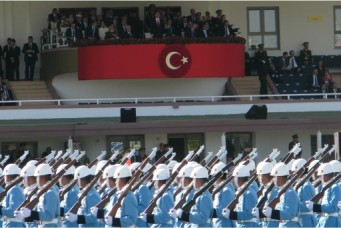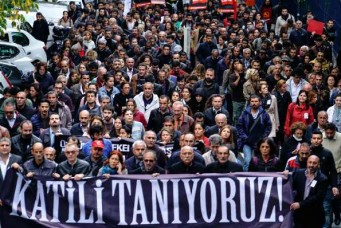Turkey Beyond Islamism and Authoritarianism
As protests spread and grew first in Istanbul, then in other parts of the country, we all struggled to conceptualize what we were witnessing. Many in Turkey opted for clear and neat narratives, which often left out other aspects of the protests and burdened events with legendary meanings ascribed onto them.
As protests spread and grew first in Istanbul, then in other parts of the country, we all struggled to conceptualize what we were witnessing. Many in Turkey opted for clear and neat narratives, which often left out other aspects of the protests and burdened events with legendary meanings ascribed onto them.
A significant portion of commentary on Turkey in international media was by and large repetition of old positions with new ‘proofs’ found in protests themselves and Turkish government’s handling of them. Many saw the fulfillment of long prophesied Turkish lapses on spectrums of Islamism-secularism or democracy-authoritarianism.
The resulting cacophony demonstrated that we were witnessing a new era in Turkey, and our intellectual tool kits were simply insufficient in making sense of it. Intense language of debates in Turkey and angry outbursts of emotions only helped to cloud our vision.
We had faced a similar situation in 2002, when the lenses we used to analyze Turkey hindered us from realizing that emergence of Justice and Development Party (AKP) in Turkey was far from victory of Islamism as we know it, but its end. The AKP was representative of a new paradigm for Islam inspired politics that blended historical romanticism, cultural identity with open markets and global integration. It had emerged from the rubble of collapsed Islamist movements and managed to move beyond their legacy.
Gradually, mainstream analysis caught up with what Turkey was going through. Many came to see a dynamic reconfiguration of power relations, socio-economic classes, place of religion in political and public space and balancing of military’s involvement in politics. Finally, a ‘model’ Muslim-majority country was emerging with its unique way of attempting to adjust to the twenty-first century.
However, the AKP’s performance took an interesting turn after the 2011 elections. The party’s reform and the drive toward European Union accession began to be questioned. Worrying political steps and emotive public statements on issues that came to symbolize Turkish culture wars, such as alcohol and abortion, began unsettling the trajectory we foresaw for Turkey after 2002.
With increasing concern over freedom of expression and media and bold statements by government officials, many feared that Turkey was losing all that it has achieved since 2002. Yet, the tectonic build up that reached a breaking point during the summer of 2013 was no return to old Turkey. That is why reading through most commentary felt like going through the blurry test lenses one tries on at an optician before finding the right one.
The story of where we are now had began by the start of early 2000s, even before the AKP was on the scene. The Turkish public was discontent and in search of a new politics and social vision. The AKP’s genius, and hence the source of its wide appeal, was not religion or ideology but the instinctive realization of a vision that hit all the right notes. The party sought EU membership yet remained faithful to conservative culture, focused on economic growth yet enhanced social services.
The AKP quickly garnered unexpected levels of votes. The old regime and other political actors—now squarely in the opposition—attempted to stop Prime Minister Recep Tayyip Erdoğan’s rise. But their old tricks backfired. With each passing year, the clear-cut power and social structures of ‘old’ Turkey crumbled, as did the narratives that anchored such institutions.
Nothing was left untouched, from Ataturk to the events of 1915. Tenuous issues like Kurds, headscarves, and the nature of Turkishness became intensely debated publicly, openly challenged, and officially altered.
The old elite and the new government clashed, shifting Turkey’s rigid top to bottom political and cultural hierarchy to a polarized battle of equals. Now, those segments of Turkish society that were previously ‘looked down’ upon—average folk who live outside of Izmir, Istanbul and Ankara—were claiming equal ownership of every previously protected arena: culture, consumption, economy, employment, academy and media.
Within that, two cultural waves swept the country. On one hand, a positive outlook was expressed through new soap operas, restaurants, boutique hotels, house decorations, and clothing; romanticism over a long lost Ottoman heritage was blended with contemporary aspirations and tastes. On the other hand, there was a deep panic, anxiety and fear, full of conspiracy theories, weekly doomsday prophesies and a genuine mourning over an imagined fall of the once grand Turkish Republic.
Turkey was now truly showing signs of late-modernity: the modern nation-state was reconfiguring itself with all the stressful alterations this causes to individuals and society at large. For the first time since the creation of Republic of Turkey, solid and fixed horizons and clear and neat boundaries—and most importantly the powers that maintained it coercively—were melting away.
Increasing consumption and prosperity demands were being generously met. Social services were being successfully advanced to meet a demanding consumer public. However, each attempt by the AKP to undo decades long issues caused by the strong nation-state legacy, such as the grievances of Kurds, Alevis and women with headscarves, caused wide stress and anxiety in parts of Turkey where these issues were hardly seen as a ‘problem.’ Similarly, each AKP foreign policy adventure, which took Turkey to places the country had never been before, was met by excitement by some and grave worries by others.
The AKP unsuccessfully attempted to offer a new uniting narrative, an anchorage for a fast changing Turkey with appeals to heritage and traditional values. Yet, none of the efforts to develop a unified Turkey 2.0 vision eased the building tensions. For the AKP, however, the future looked bright with the record breaking results of the 2011 elections, utter absence of opposition parties and weakened pressure of the EU accession talks. But, it was a deceptive brave new world.
The AKP quickly found that even though it indeed enjoyed high vote rates and no competitor, it could not simply enjoy the same level of power that the system it fought against once had. Thanks to its own reforms, neither the public nor the realities of where Turkey was could go along with it. Thus, what we saw in the party’s 2012 and 2013 performance was not the ‘mastery phase’ that the prime minister had launched.
On the contrary, we saw increasingly weak attempts to exercise sovereignty. Prime Minister Erdoğan’s public tone and stand often gave the aura of harsh words of a strong man; in actual terms, they were anxious attempts to hold on to a power which is no longer possible in Turkey. Within that feeble position, politics of culture and public morality provided a sense of legitimate power base.
Autonomous state power has slowly disappeared, and power could only be provided by unshaken commitment of a substantial constituency and complex web of relations with the business world and interest groups. Now that Turkey was a country of consumers and suffered from the well-known postmodern curse of fragmented and absent ideologies, the emotive politics of culture was the only rallying point left both for the AKP and its mimesis die-hard ‘secular’ opposition. Thus alcohol or building of a mosque became hyped symbolic battlegrounds over the soul of Turkey.
This difficulty of managing the new Turkey with ease, as well as socio-psychological turbulence of living in a country of constant change, became all the more apparent as the historic process of talks and agreements with outlawed Kurdish militant group PKK began. Beyond the smoke screen of ‘laicete versus Islam’ tension, the PKK peace process was an actual challenge and caused wide worries among Turks. Many Turks saw the AKP’s gestures towards PKK and plans to end a decades long low-scale armed conflict as ‘selling out.’
Therefore, even though what we saw in Turkey during June and July 2013 looked to be truly chaotic outbursts of so many different grievances, aspirations, worries and reactions, on some level it made perfect sense. The social and political hierarchies that held these relations intact and dealt with them in far away places from the eyes of ‘modern’ Turks were no longer there. And each AKP attempt to utilize old-state tricks with heavy-handed social control only made things worse. Deep polarization and often unnamed or unfocused anger now dominated the public space.
It might be counterintuitive, but these developments are ultimately promising signs that, for the first time, Turkey is facing the challenge of democracy after decades of keeping all of the unprocessed issues under the carpet. Turkish state’s strong micro-management had only postponed this inevitable stressful reckoning with all of the unresolved tensions.
The events of June and July also revealed the Achilles heel of Turkish success story: a weak democratic culture. All sides unleashed intense accusations and derogatory slurs in the utter absence of thoughtful public engagement. Any view beyond ‘either/or’ or any person who is not with ‘us/them’ became intolerable even for individuals who have often followed a liberal course. Thus, wholesale support or condemnation of AKP and Erdogan were the only options in Turkey this summer. Erdoğan was either the savior of Turkey or the new Hitler.
What has been demystified this summer is not simply Erdoğan or the AKP, but the state of Turkey and the Turkish public at large. It became clear that the modern nation state that had promised to be our ‘father’ and manage the state’s affairs on our behalf has left us ill equipped to be democratic ‘adults.’ It seemed that all of our glittering advancements or perceptions of our place in the global arena were beyond our actual capacity as a society to cope with plurality.
It is no surprise that many domestic and foreign readings of Turkey seemed only right to a certain extent, but not quite right. Turkey is confusing to capture, because she is confused herself. The country is going through a liminal phase, which heightens emotions and reactions. Even the most common policy issues or unconnected incidents across the country quickly turn into a Manichean battle between light and darkness.
How Turkey will come out of this new uncharted territory is not clear. As the country is gearing towards local and presidential elections in 2014, it is highly likely that we will see more protests, angry outbursts and intense public discussions. When they do happen, we’d do well by seeing them as signs of a healthy but painful process Turkey is going through and take the hyperbolic descriptions and analysis of events with a grain of salt.
Ziya Meral is a UK-based Turkish researcher and author.



